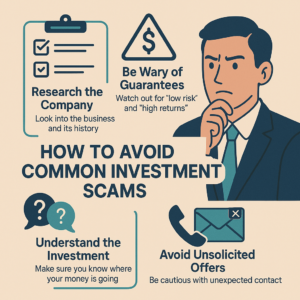Introduction
Investment scams have been on the rise, preying on unsuspecting individuals seeking financial growth. Fraudsters use deceptive tactics to trick investors into schemes promising high returns with minimal risks. Avoiding these scams requires knowledge, vigilance, and a keen eye for red flags. This article explores common investment scams, how to identify them, and the best practices to protect your hard-earned money.
Definition of Investment Scams
An investment scam is a fraudulent scheme designed to deceive individuals into investing their money under false pretenses. Scammers often promise exaggerated returns, use complex jargon to appear legitimate, and create a sense of urgency to manipulate victims into making quick decisions.
Application of Investment Scams
Investment scams can take many forms, affecting individuals and organizations alike. They can occur online, over the phone, through email, or even in person. Some common types include:
- Ponzi Schemes – Paying early investors with money from new investors instead of legitimate profits.
- Pyramid Schemes – Similar to Ponzi schemes, but require victims to recruit others to earn money.
- Pump-and-Dump Schemes – Inflating stock prices through false hype and selling once prices peak.
- Fake Initial Coin Offerings (ICOs) – Promising new cryptocurrency ventures that never materialize.
- Advance-Fee Fraud – Requiring upfront payments for non-existent investment opportunities.
- Offshore Investment Fraud – Encouraging investments in foreign companies to avoid regulation.
How to Avoid Investment Scams
1. Research the Investment and the Promoter
Always verify the credentials of the individual or firm offering the investment. Check their background through financial regulatory authorities like the Securities and Exchange Commission (SEC) or the Financial Industry Regulatory Authority (FINRA).
2. Be Wary of “Guaranteed” High Returns
If an investment promises extremely high returns with little or no risk, it’s likely a scam. All investments carry some level of risk, and legitimate opportunities do not offer unrealistic guarantees.
3. Understand the Investment
Never invest in something you don’t understand. Scammers often use complex terminology to confuse investors. Take time to research the product, market trends, and risk factors.
4. Check for Proper Licensing and Registration
Verify whether the company is registered with relevant financial authorities. Unregistered firms are often fraudulent.
5. Avoid Pressure Tactics
Scammers create urgency to force quick decisions. Be cautious if someone insists you must act immediately to secure the opportunity.
6. Look for Independent Reviews
Check independent sources for reviews. Avoid investments where information is only available from the promoter.
7. Beware of Unsolicited Offers
If you receive unexpected investment opportunities via email, phone, or social media, exercise caution. Legitimate investments are rarely promoted through cold calls.
8. Be Skeptical of Secretive or Exclusive Investments
Scammers often present their schemes as “exclusive opportunities” or claim they are available to a select few. Transparency is key in legitimate investments.
9. Monitor Your Investments
Regularly check your investment portfolio for inconsistencies or suspicious activities. If you notice anything unusual, investigate immediately.
10. Consult a Financial Advisor
A licensed financial advisor can help you assess the legitimacy of an investment opportunity before committing your funds.
Cooperative Table: Identifying Red Flags in Investment Scams
| Scam Type | Red Flags | Prevention Tips |
|---|---|---|
| Ponzi Scheme | High returns, little risk, pays from new investors | Verify with financial authorities |
| Pyramid Scheme | Requires recruitment to earn money | Avoid schemes without real product or service |
| Pump-and-Dump | Sudden hype about unknown stocks | Research stocks before investing |
| Fake ICOs | No white paper, vague details | Check ICO credibility and regulatory status |
| Advance-Fee Fraud | Upfront payment required | Never pay fees before receiving service |
| Offshore Investment Fraud | Claims of tax-free high returns | Verify company registration and legitimacy |
Benefits of Avoiding Investment Scams
- Financial Security: Protects your hard-earned money from fraudulent losses.
- Peace of Mind: Reduces stress by ensuring your investments are safe.
- Long-Term Growth: Enables you to focus on legitimate investment opportunities.
- Better Decision-Making: Enhances financial literacy and awareness.
Limitations of Scam Prevention
- Evolving Tactics: Scammers continuously develop new ways to deceive investors.
- False Sense of Security: Even experienced investors can fall victim to well-crafted scams.
- Legal Challenges: Recovering lost funds can be difficult if scammers operate in foreign jurisdictions.
Conclusion
Investment scams are becoming more sophisticated, making it crucial for investors to stay informed and vigilant. By recognizing red flags, researching opportunities, and consulting financial experts, you can significantly reduce your risk of falling for fraudulent schemes. Always remember: if something seems too good to be true, it probably is.
Frequently Asked Questions (FAQs)
1. How can I verify if an investment company is legitimate?
Check with regulatory bodies like the SEC, FINRA, or your local financial authorities to confirm registration.
2. What should I do if I suspect an investment scam?
Report it to authorities such as the Federal Trade Commission (FTC), SEC, or your country’s financial regulatory body.
3. Are online investment opportunities safe?
Not all online investments are scams, but always research the platform, reviews, and regulatory status before investing.
4. What are the biggest warning signs of a scam?
Guaranteed high returns, pressure tactics, secrecy, unlicensed promoters, and lack of transparency.
5. Can I recover money lost in an investment scam?
It depends on the scam. Legal action may be possible, but recovery is often difficult, especially with offshore fraudsters.
6. How do scammers gain the trust of investors?
They use professional-looking websites, fake testimonials, and complex jargon to appear legitimate.
7. Are cryptocurrency investments always scams?
No, but many scams exist in the crypto space. Always verify the credibility of an ICO, exchange, or investment opportunity.
8. Why do people fall for investment scams?
Scammers exploit greed, fear of missing out (FOMO), lack of knowledge, and urgency to lure victims.
9. How can I report an investment scam?
Contact your local financial regulatory authority, consumer protection agencies, or fraud reporting services.
10. What’s the safest way to invest money?
Diversify your investments, consult licensed professionals, and only invest in well-researched opportunities.
By staying cautious and well-informed, you can protect yourself from falling victim to investment scams and secure a stable financial future.
Related Topics:-
How Can I Quickly Improve My Credit Score in the U.S.A
How to Refinance Student Loans with Bad Credit in the USA?
Best Credit Cards for Cash Back Rewards in the U.S.A
Best high-yield savings accounts 2025
For further details access our website https://vibrantfinserv.com/
To visit: https://www.mca.gov.in/
Contact:В В В В 8130555124, 8130045124
Whatsapp:В В https://wa.me/918130555124
Mail ID:В В В В В В operations@vibrantfinserv.com
Web Link:В В В https://vibrantfinserv.com
FB Link:В В В В В В https://fb.me/vibrantfinserv
Insta Link:В В https://www.instagram.com/vibrantfinserv2/В


